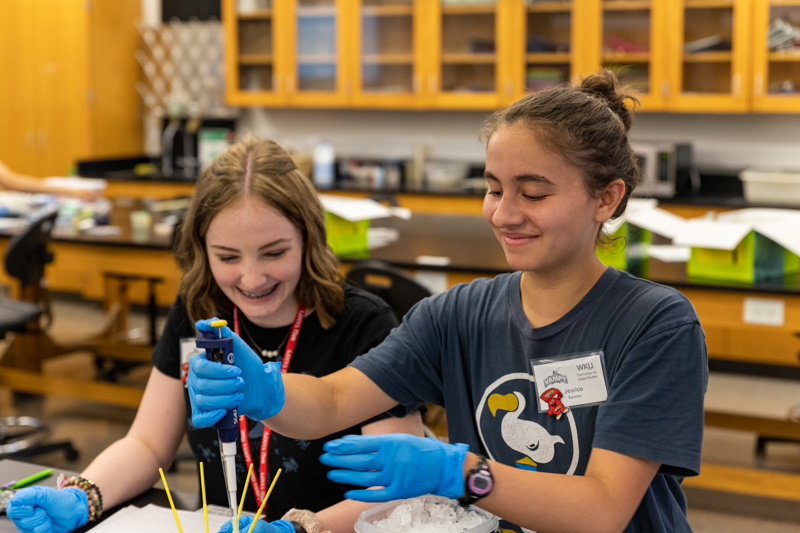By the Duke Talent Identification Program
Educators, researchers, and parents often observe perfectionist behaviors in gifted students. It comes as no surprise, since these students are bombarded daily by parents, teachers, peers, and an entertainment industry that rewards them and encourages them to make the highest grade, produce a perfect painting, give a flawless performance, and gain admission into the best college. What are the characteristics of a perfectionist? Is perfectionism helpful or detrimental to a student’s success? What can be done to help students who place too much importance on perfection?
Some researchers believe that there are two types of perfectionism: healthy or normal perfectionism, and unhealthy or neurotic perfectionism. Healthy perfectionists want to do their best, enjoy challenges, and welcome opportunities to stretch thinking and learning as far and wide as possible. They work, practice, and study to please themselves and are delighted when their efforts yield success. They attempt to learn from their mistakes and seldom give in to disappointment. Some researchers believe that normal perfectionism is a healthy part of striving for excellence.
“What is the difference between a healthy striving for excellence and a neurotic preoccupation with perfection?” —Wayne D. Parker
By contrast, neurotic or unhealthy perfectionists set unrealistic goals. They work hard, not to please or to challenge themselves but to avoid failure. Instead of delighting in challenges, they feel drained or depressed when they attempt new ones. They often have low self-esteem and are sensitive to criticism from parents and teachers. They believe that their parents expect them to be perfect, even if the parents have never expressed this expectation. Mistakes or failures humiliate and embarrass neurotic perfectionists. Fear of making mistakes causes never-ending anxiety and worry, which can lead to additional emotional and social problems.
A recent Goals and Work Habits Survey, administered to high-achieving, academically gifted students in a rural middle school, found that 87.5 percent were perfectionists. The majority of them were within the normal range of perfectionism, as defined by researcher Patricia A. Schuler, and viewed order and organization as important in achieving their “personal best.” Nearly 30 percent of those surveyed were neurotic perfectionists.
Several personality theorists believe, however, that any perfectionism is detrimental to a student’s well-being. Dr. Thomas S. Greenspon labels normal perfectionism an oxymoron and says that there is no hard evidence that perfectionism is anything but “a burden to most people who experience it.” According to Greenspon, researchers confuse normal perfectionists with high achievers. High achievers may have perfectionist characteristics, but even these characteristics by themselves are unhealthy. Motivation, talent, hard work, and energy cause students to achieve success. Without these traits, perfectionism usually results in frustration and low self-esteem.
Perfectionists, says Greenspon, constantly struggle to achieve goals, make high grades, or produce other excellent results to prove themselves to their parents or others. They feel no joy in working hard or meeting challenges. Instead, they have the mistaken notion that hard work and success will make others love, respect, or value them as people.
But therapy and classroom-based interventions can improve or reverse perfectionists’ negative feelings and attitudes. Teachers who provide a supportive, encouraging atmosphere can teach students alternative strategies to deal with their need for perfection while maintaining a desire for high achievement. Classroom-based interventions include self-evaluation and nonthreatening grading procedures, group therapy discussions that allow students to vent their feelings and to listen to other students’ similar feelings, and an environment that allows and accepts failure and gives students the opportunity to relearn material or to retake exams until they achieve mastery.
There is no evidence that perfectionism occurs more often in gifted students. However, many gifted students experience some negative perfectionist tendencies at some point in their lives. When these tendencies lead to constant expectations or demands for excellence, parents and teachers should seek therapy for the students or intervene to help them cope with the struggle.
—Teri Cooper Brown
Teri Cooper Brown is a veteran educator and full-time freelance writer on gifted education, child development, family life, parenting, travel, and juvenile nonfiction. She is a former gifted/talented resource teacher and an advocate for gifted children.
This article is based on a special issue of the Journal of Secondary Gifted Education (summer 2000, vol. 11, no. 4), which included “Healthy Perfectionism in the Gifted,” by Wayne D. Parker; “‘Healthy Perfectionism’ is an Oxymoron!” by Thomas S. Greenspon; and “Perfectionsim and the Gifted Adolescent,” by Patricia A. Schuler.
Reading
- Freeing Our Families from Perfectionism, by Thomas S. Greenspon, Free Spirit, 2001
- The Nurture Assumption, by Judith Rich Harris, Free Press, 1998
- Perfectionism, by Miriam Adderholdt-Elliott and Jan Goldberg, Free Spirit, 1999
- When Perfect Isn’t Good Enough, by Martin M. Antony and Richard P. Swinson, New Harbinger, 1998

